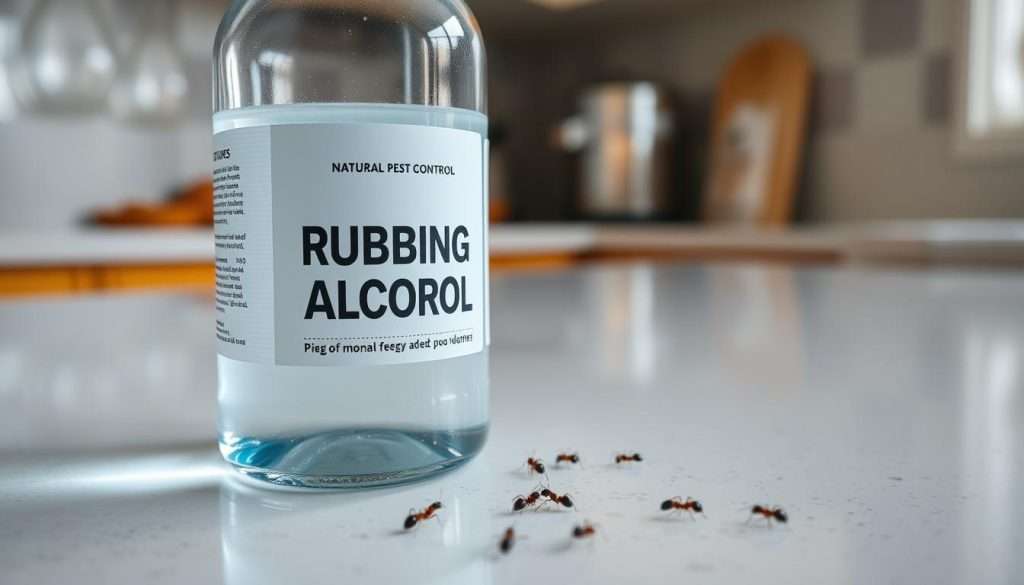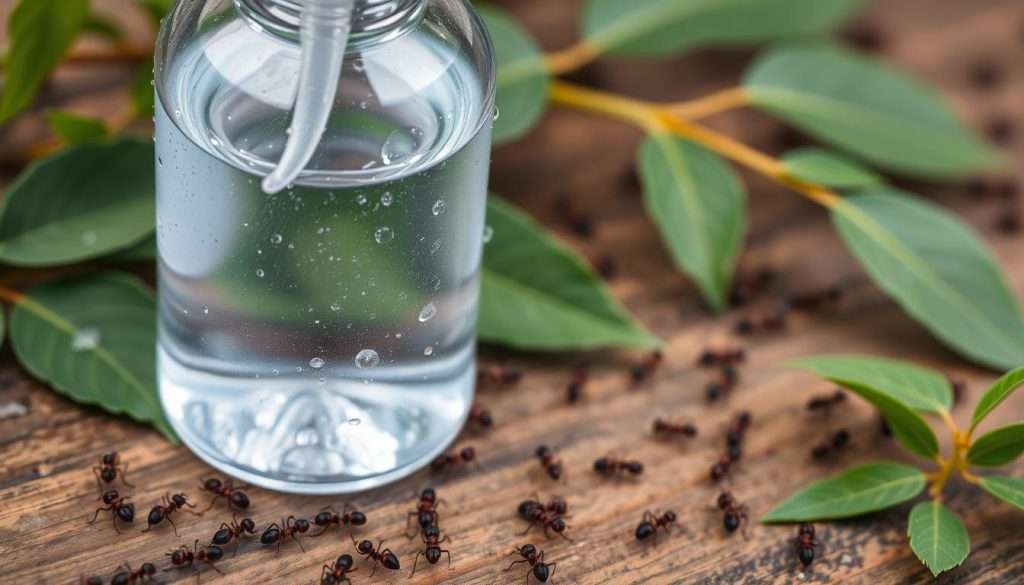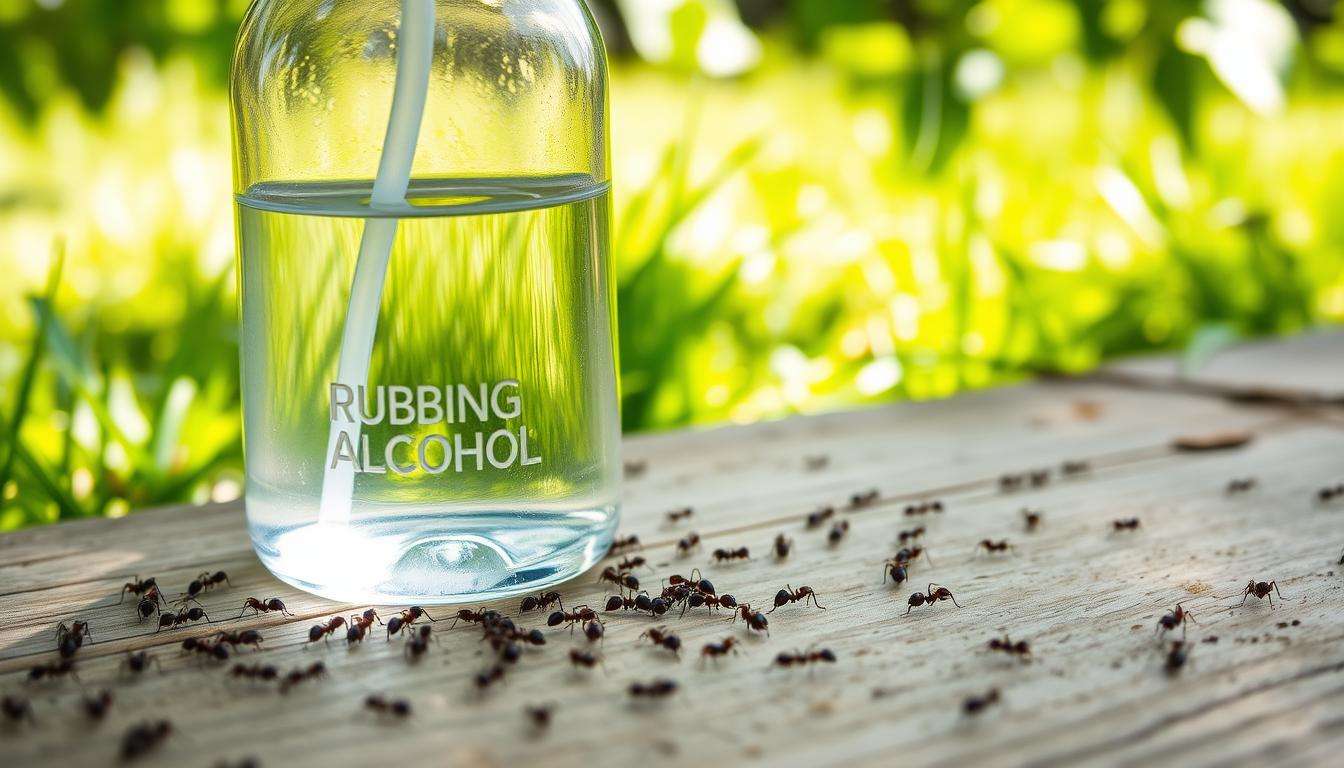Are ants taking over your home? You might wonder if rubbing alcohol can help. This guide explores rubbing alcohol’s role in fighting ants. It’s a natural way to keep your home pest-free.
Rubbing alcohol, especially isopropyl and ethanol, can kill ants on contact. It’s a good choice for those who like to tackle problems themselves. We’ll look at how alcohol works on ants, how to use it, and ways to keep ants away.
Key Takeaways
- Isopropyl alcohol is highly effective against ants when applied directly.
- Ethanol-based mixtures offer moderate effectiveness in ant control.
- Commercial ant sprays often combine alcohol with additional active ingredients for enhanced results.
- Essential oils like peppermint and tea tree also act as strong natural ant repellents.
- Proper application techniques ensure optimal pest control using alcohol-based solutions.
- Regular home maintenance can prevent ant infestations before they start.
The Effectiveness of Rubbing Alcohol for Ant Control
Knowing how rubbing alcohol affects ants helps in using it to kill ants naturally. Rubbing alcohol, with about 70% isopropyl alcohol, kills ants by dehydrating them. It works by getting into the ants’ shells and causing dehydration, which leads to death. This method can kill or stop ants but doesn’t solve long-term problems.
Understanding Alcohol’s Impact on Ant Physiology
Applying rubbing alcohol disrupts an ant’s body by affecting its shell. The alcohol causes dehydration and blocks oxygen. While it might seem to work, it’s only a short-term fix. You need more ways to keep ants away for good.
Comparing Alcohol to Other Natural Ant Remedies
Many people look for natural ways to keep ants away. Rubbing alcohol can keep some ants away, but vinegar, cinnamon, and citrus peels might work better. These items can keep ants from coming back. Also, ant baits with slow-acting poison are good because they kill the queen and the whole colony.
In summary:
- Rubbing alcohol is a fast-acting contact killer.
- Rapid evaporation limits its efficacy in intricate ant routes.
- Natural repellents can provide a safer alternative with varying degrees of success.
- Ant baits effectively target entire colonies.
For long-term ant problems, especially with big colonies like red imported fire ants, you might need a pest control expert. They can make sure all ants are gone.
Does Rubbing Alcohol Kill Ants
Learning how rubbing alcohol kills ants can help you fight pests better. It not only kills ants but also stops them from communicating and finding food. Rubbing alcohol blocks their scent trails, making it hard for them to move and work together.
How Alcohol Affects Ant Behavior
Rubbing alcohol kills ants in many ways. It dissolves their outer layer, causing dehydration and death. It also stops them from following scent trails, which ants use to find food and get back to their homes.
Scientific Insights into Alcohol as an Ant Killer
Studies show rubbing alcohol is great at killing ants. It works as a direct killer, causing immediate harm. Rubbing alcohol can also keep ants away and kill them when they touch it. This makes it a good choice for natural pest control. For more info, check out scientific insights alcohol ant killer methods.

| Feature | Isopropyl Alcohol | Other Natural Solutions |
|---|---|---|
| Contact Killer | Yes | Varies |
| Disrupts Pheromone Trails | Yes | No |
| Residue Effect | No | Varies |
| Application Ease | Easy | Moderate |
| Safety | Flammable | Depends on ingredient |
Types of Alcohol Utilized in Pest Control
Different types of alcohol are used in pest control. Isopropyl alcohol and ethanol-based solutions are common. Knowing about them helps choose the best for ant problems.
Isopropyl Alcohol (Rubbing Alcohol) Explained
Isopropyl alcohol, or rubbing alcohol, is used in many homes. It comes in 70% to 99% concentrations, with 70% being best for many tasks. It kills ants when sprayed but dries fast.
This fast drying makes it hard to reach ant nests. So, rubbing alcohol might not solve the whole problem.
Ethanol-Based Solutions for Ant Control
Ethanol-based solutions are another choice for ants. They are in many household items and mess with ants’ trails. Like isopropyl alcohol, ethanol works well but might be used differently.
Some like ethanol for its milder smell and eco-friendly options.
Commercial Ant Sprays Containing Alcohol
Commercial sprays mix alcohol with oils and surfactants. They aim to better target ants. These sprays use natural stuff to help without harming the planet.
For big ant problems, these sprays are good. They work best with other ways to stop ants.
| Type of Alcohol | Effectiveness | Best Use Case |
|---|---|---|
| Isopropyl Alcohol | Moderate, temporary | Visible ant removal |
| Ethanol-Based Solutions | Moderate, disruption of trails | Ant navigation hindrance |
| Commercial Alcohol Sprays | High, targeted elimination | Significant infestations |
Safe Application Techniques for Ant Control
Using rubbing alcohol to fight ants needs careful safe application techniques for ants. Knowing how to spray it right makes it work better. This way, you can keep ants away from your home.
Spraying Methods for Optimal Coverage
Here are tips for spraying rubbing alcohol ant repellent:
- Use a fine-mist spray bottle for even coverage on ant trails and nests.
- Focus on entry points like doors and windows to keep ants out.
- Spray on ant trails to mess with their signals and confuse them.
- Keep reapplying after cleaning to keep ants away.
Creating Protective Barriers
Setting up barriers also helps fight ants. Here’s how to do it:
- Find where ants get in, like wall cracks and window gaps.
- Clean these spots well before using rubbing alcohol to remove food.
- Apply the alcohol ant spray around these spots to block ants.
- Use sticky tape or traps to catch any ants that try to get in.
For homes with kids or pets, safety is key. Always spray rubbing alcohol in open air to avoid breathing it in. Using these safe application techniques for ants keeps your home safe and ants away. For more tips and products, see this resource.

| Method | Description | Benefits |
|---|---|---|
| Spraying | Using a fine-mist spray bottle to apply rubbing alcohol directly to ants and their trails. | Immediate impact on ant behavior and communication disruption. |
| Barrier Creation | Applying alcohol around potential entry points to deter ants. | Prevents ants from entering the space and gathering in trails. |
| Reapplication | Regularly applying the alcohol solution, especially after cleaning. | Maintains efficacy over time, reducing the chance for re-infestation. |
Homemade Rubbing Alcohol Ant Spray Recipe
Making a homemade rubbing alcohol ant spray is a great way to get rid of ants. It’s easy and doesn’t use harsh chemicals. Here’s what you need and how to make this alcohol ant bait.
Materials Needed for DIY Solution
- 1 cup of rubbing alcohol (isopropyl alcohol)
- 1 cup of water
- A clean spray bottle
- Optional: 15 drops of essential oils (peppermint, tea tree, or citrus)
Step-by-Step Instructions for Mixing
- First, measure one cup of rubbing alcohol and one cup of water.
- Pour both liquids into a clean spray bottle.
- If you want, add 15 drops of your favorite essential oils for extra power.
- Close the bottle and shake it well to mix everything.
- Write on the bottle what it is, so you know later.
- To use, spray it right on ant trails or where you see ants.
Remember to test a small area first. This is to make sure it won’t damage your surfaces. Rubbing alcohol in this spray stops ants from following trails. It’s a smart way to control ants and keeps your home safe.
Best Practices for Using Alcohol in Pest Control
Using alcohol for pest control needs careful thought. The timing and how often you treat are key. Ants are most active at specific times, so pick the right moments to apply.
When to Apply Alcohol Treatments
Ants are busiest in the early morning and late evening. Treating during these times can make your efforts more effective. Watch your space to see when ants are most active. This helps you plan your treatments better.
Frequency of Application for Maximum Effectiveness
Knowing how often to use alcohol is crucial for pest control. A 50% isopropyl alcohol solution is good for plants. It controls pests without harming your plants.
Don’t treat more than twice a week. This avoids harming your plants and keeps pests away. Watch for ants to decide if you need to treat more often. Rubbing alcohol can kill ants by breaking their pheromone trails. This can help reduce their numbers over time.
Conclusion
Rubbing alcohol is a great way to fight ants naturally. It kills ants by dissolving their outer shell and messing with their smell signals. This makes your home less welcoming to ants.
Making your own rubbing alcohol spray is easy and effective. Mix isopropyl alcohol with water to create a strong solution. This solution not only kills ants but also keeps them away. It’s a smart move for keeping your home pest-free.
With the right knowledge, you can keep your home free from pests. Rubbing alcohol can help you get rid of ants or keep them away. Use these tips to make your home a comfortable place without pests.
